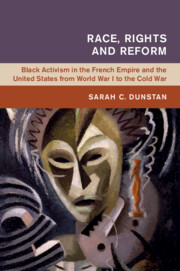 Race, Rights and Reform
Race, Rights and Reform Book contents
- Race, Rights and Reform
- Global and International History
- Race, Rights and Reform
- Copyright page
- Contents
- Acknowledgments
- Notes on Terminology and Language
- Introduction
- 1 Black Is a Country, n’est-ce pas? Race, Rights and Nation in the Wilsonian Moment
- 2 Anti-imperial Comrades: Black Radicalism and the Communist Possibility
- 3 La vogue nègre: Racial Renaissance at the Intersection of Republic, Empire and Democracy
- 4 Civilization’s Gone to Hell? Revolutionary Poetry, Humanism and the Crisis of Sovereignty
- 5 Give Me Liberty! Black Intellectual Struggles against Fascism in the Fight for Democracy
- 6 “A New Fascism, the American Brand”: Anti-communism, Anti-imperialism and the Struggle for the West
- 7 “The Sword of Damocles”: Présence Africaine and Decolonization in the Face of the Cold War
- Epilogue
- Bibliography
- Index
5 - Give Me Liberty! Black Intellectual Struggles against Fascism in the Fight for Democracy
Published online by Cambridge University Press: 01 March 2021
- Race, Rights and Reform
- Global and International History
- Race, Rights and Reform
- Copyright page
- Contents
- Acknowledgments
- Notes on Terminology and Language
- Introduction
- 1 Black Is a Country, n’est-ce pas? Race, Rights and Nation in the Wilsonian Moment
- 2 Anti-imperial Comrades: Black Radicalism and the Communist Possibility
- 3 La vogue nègre: Racial Renaissance at the Intersection of Republic, Empire and Democracy
- 4 Civilization’s Gone to Hell? Revolutionary Poetry, Humanism and the Crisis of Sovereignty
- 5 Give Me Liberty! Black Intellectual Struggles against Fascism in the Fight for Democracy
- 6 “A New Fascism, the American Brand”: Anti-communism, Anti-imperialism and the Struggle for the West
- 7 “The Sword of Damocles”: Présence Africaine and Decolonization in the Face of the Cold War
- Epilogue
- Bibliography
- Index
Summary
Chapter 5 is an investigation into the way that black intellectuals understood the War and continued to struggle for the realization of the promises of republican democracy in its immediate aftermath. Black Americans such as Langston Hughes and W. E. B Du Bois saw many parallels between the racism of Hitler’s National Socialism and the racism of empire and Jim Crow segregation. So too did thinkers such as the French-Guyanese poet Leon Gontran-Damas and the Martinican poet-turned-politician, Aimé Césaire, understand fascism as a product of the same thinking that spurred France’s so-called mission civilisatrice. Drawing on publications in journals, personal correspondence and the United Nations archives, this chapter argues that these black intellectuals increasingly conceived of freedom not just in terms of political liberation but of liberty from the sense of cultural and intellectual inferiority created by fascism, imperialism and racism. Allied Victory in the Second World War and the foundation of the United Nations upon seemingly anti-imperial and anti-racist lines appeared to provide an opening for the transformation of the West toward such a formulation of liberty.
- Type
- Chapter
- Information
- Race, Rights and ReformBlack Activism in the French Empire and the United States from World War I to the Cold War, pp. 148 - 189Publisher: Cambridge University PressPrint publication year: 2021


